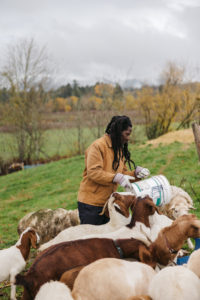As another roller-coaster of a year comes to a close, you'd be forgiven for complaining of motion sickness. With ups and downs throughout 2021, our deep gratitude continues for all the essential workers in retail grocery and healthcare — our hats come off to you, our masks stay on!
Below you'll find a compilation of the food and farming sector's best and worst news stories of 2021. Highlights included wins for farmers' groups around the globe. As for the lowpoint — more setbacks in the struggle to right discrimination faced by farmers of color. The saga of AquaAdvantage salmon gets a special section all its own: 2021's Fishiest Story (admittedly, a niche category).
For your enjoyment, food system stories from the year that was.
The Best
African Farmers Push Back
In May, 35 member organizations from the Alliance for Food Sovereignty in Africa (AFSA) wrote an open letter requesting that funding for the Alliance for a Green Revolutionin Africa (AGRA) be redirected towards African-led efforts expanding agroecology and low-input farming systems. The AGRA initiative failed to meet its own targets and had negative impacts in some African countries.
Mexico upholds ban on GM corn cultivation
In October, Mexico's Supreme Court sided with citizen activists, refusing to overturn an injunction restricting GMO corn cultivation. This ruling supports the current Mexican government's mandate to revitalize rural economies, despite ongoing pressure from U.S. seed companies, and it helps preserve Mexico’s special status in the world as the birthplace of cultivated, heirloom maize–the origin of corn on Earth.
Year-long protest in India ends in victory
In November, mass farmer protests in India ended after the Prime Minister announced plans to repeal agricultural reform laws that threatened farmer livelihoods. Thousands of farmers had occupied the protest camp on the outskirts of Delhi for a year, enduring extreme weather conditions and covid-19's devastating delta variant.
Growth of organic and non-gmo
Organic acreage in the U.S. grew 5% from the previous year, reaching 9.3 million acres. More good news on the (organic and non-GMO) horizon: The Rodale Institute, agribusiness giant Cargill and organic poultry producer Bell & Evans announced the U.S. Organic Grain Initiative, a partnership to transition 50,000 acres of corn and soybeans to non-GMO and organic over the next 5 years. Bell & Evans described the partnership as "the largest market-financed organic grain transition program backed by science in the world, creating a model for the rest of the food industry."
Roundup to be eliminated from home use
Bayer-Monsanto pledged to remove controversial weedkiller Roundup from the residential market by 2023. The change comes amidst a barrage of litigation by users of the glyphosate-based product, many of whom blame Roundup for serious health issues such as cancer. Roundup will still be available for commercial use, and it is the main companion of Roundup Ready GMOs, but we'll take the partial victory. For now.
The Worst
So much synbio
Three major synthetic biology companies launched the SynBio Coalition, a partnership for promoting investment in and support for the U.S. synbio industry. Synthetic biology is one of the fastest-growing sectors in biotechnology, as Non-GMO Project Executive Director Megan Westgate explains in this recent webinar.
IFF DuPont Merger
IFF announced its merger with DuPont’s Nutrition & Biosciences. The new company is expected to dominate the marketplace for ingredients in the areas of taste, texture, scent, nutrition, enzymes, cultures, soy proteins, and probiotics. This is just one example of the kind of consolidation fueling monopolization in the food sector.
Corporate controls the conversation
Corporate influence dominated important conversations this year — even inspiring a spin-off conference as a form of resistance. The first UN Food Systems Summit might have been branded the "People's Summit," but many of those people boycotted in response to corporate influence. Similar reports came from the Sustainable Agriculture Summit, where private industries seemed to focus on protecting their interests rather than addressing the very real problems facing the global food system. These examples reflect a larger effort led by Big Ag to co-opt agroecology and regenerative principles, effectively greenwashing their own product lines.
Two chances to fight injustice. Both tanked.
 In June, $5 billion in debt relief for farmers of color stalled after multiple law suits alleged the measure was discriminatory against white farmers. If only the same attention had been paid to discrimination during the century of racist policies that have nearly wiped out Black farmers, who now make up less than 2% of food and commodity producers.
In June, $5 billion in debt relief for farmers of color stalled after multiple law suits alleged the measure was discriminatory against white farmers. If only the same attention had been paid to discrimination during the century of racist policies that have nearly wiped out Black farmers, who now make up less than 2% of food and commodity producers.
Following this setback, an alternative pathway was woven into the Build Back Better Act, but as of mid-December that, too, has been scuttled. According to Mark Rosenbaum, an attorney involved in the litigation, “It’s not an exaggeration to say that whether or not there are Black farmers in America could depend on this case.”
UK's relaxed attitude on GMOs 
The UK continued to show a fresh face to the world after leaving the EU, announcing it would allow gene-edited organisms to be developed and commercialized essentially without regulation. New GMOs in Great Britain will face no more scrutiny than products of traditional crossbreeding — despite being new organisms that have never before been consumed by humans. This is a stark divergence from the European High Court's 2018 ruling deciding that GMOs made with emerging techniques would be assessed and regulated like traditional GMOs.
The Fishiest
AquaAdvantage salmon is 2021's fishiest tale
This story has a migratory pathway to compete with even the longest-journeying salmon.
In May, the first generation of AquaBounty's fast-growing GMO salmon reached maturity and was harvested and sold. Meanwhile, widespread consumer rejection of GMOs led more than 80 grocery chains, seafood companies, restaurants and food service companies to publicly pledge not to sell the salmon. In fact, though AquaBounty reports it has sold out of the GMO salmon, only one restaurant supplier admits to having bought it. Under the new bioengineered labeling law, AquaAdvantage salmon need not be labeled in restaurants, meaning consumers are likely to remain in the dark about what's on their plates if they order salmon at a restaurant.
Amidst all this splashing around, Alaska senator Lisa Murkowski reintroduced the GE Salmon Labeling Act which would bolster the existing federal BE labeling law, "making sure that any consumer who finds GE products in a retailer or restaurant know what they’re purchasing." As of writing, the bill continues its journey through the senate.
2022 and beyond
At the Non-GMO Project, we remain dedicated to a sustainable and equitable food system for generations to come. We are also deeply grateful to the many brands, activists, citizens, farmers and researchers who work towards such a future.
Supporters of the Butterfly are critical voices in this movement — we wish you all a happy and healthy new year!

